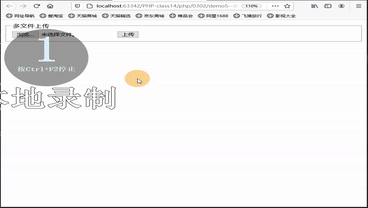程序运行截图
一、多文件上传,上传类封装,思路总结
1、 上传代码封装为UpLoad.php类文件;2、 UpLoad.php上传类提供,upLoadFile(文件上传)、checkErrorCode(错误码检测)、checkType(文件类型检测),3个公有方法;3、 UpLoad.php上传类中,上传文件的命名采用当前时间 + 3位随机数来实现;4、 在测试文件中,实例化UpLoad.php上传类,并将上传的文件由$_FILES[]超全局变量接收后,传给上传类;
1、多文件上代演示demo.php代码
<?phpspl_autoload_register(function ($name) { $file = str_replace('\\', DIRECTORY_SEPARATOR, $name) . '.php'; require $file;});if (!empty($_POST)) { $files = $_FILES['file']; $upload = new UpLoad(); $upload->upLoadFile($files);}?><form method="post" enctype="multipart/form-data"> <fieldset> <legend>多文件上传</legend> <input type="hidden" name="MAX_FILE_SIZE" value="1000000"> <!-- 添加 multipart name的值写成php数组的格式 --> <input type="file" multiple name="file[]"> <input type="submit" value="上传"> </fieldset></form>
2、封装的UpLoad.php类代码
<?phpclass UpLoad{ private $error; //保存错误信息 public function upLoadFile($files) { foreach ($files['error'] as $key => $error) { if ($this->checkErrorCode($error)) { //调用文件类型验证函数 if ($this->checkType($files['tmp_name'][$key])) { // 现在随机文件名样板:20210309033027827,时间正规写法date('Y-m-d H:i:s'), $randName = date('YmdHis') . '_' . rand(100, 999); $path = './upload/' . $randName . strrchr($files['name'][$key], '.'); //echo $path, '<br>'; if (move_uploaded_file($files['tmp_name'][$key], $path)) { echo "<h2 style='color:green'>{$files['name'][$key]}上传成功</h2>"; echo "<img src='{$path}' width='150' />"; } } else { echo "<h2 style='color:red'>{$files['name'][$key]}, {$this->errorMsg}...</h2>"; } } else { echo "<h2 style='color:red'>{$files['name'][$key]}, {$this->errorMsg}...</h2>"; } } } public function checkErrorCode($ErrorCode): bool { if ($ErrorCode != 0) { switch ($ErrorCode) { case 1: $this->errorMsg = '文件超过系统允许的最大值'; return false; case 2: $this->errorMsg = '文件大小超过了表单允许的最大值'; return false; case 3: $this->errorMsg = '只有部分文件上传'; return false; case 4: $this->errorMsg = '没有文件上传'; return false; case 6: $this->errorMsg = '找不到临时文件'; return false; case 7: $this->errorMsg = '文件写入失败'; return false; default: $this->errorMsg = '未知错误'; return false; } } else { return true; } } public function checkType($file): bool { //第一步:创建finfo资源 $info = finfo_open(FILEINFO_MIME_TYPE); //第二步:将finfo资源和文件做比较,识别出文件mime类型 $mime = finfo_file($info, $file); //第三步,比较是否合法 $allow = array('image/jpeg', 'image/png', 'image/gif'); //允许的类别 if (in_array($mime, $allow)) { return true; } else { $this->errorMsg = '文件类型不合法...'; return false; } }}
二、MVC与依赖注入的原理
1、 此示例制作三个文件,Model.php(模型类)、View.php(视图类)、Controller.php(控制器类);2、 Model.php(模型类)中,封装了获取数据库数据的方法;3、 View.php(视图类)中,封装了显示界面;4、 Controller.php(控制器类)中,封装了服务容器Container类;5、 服务容器Container类中,提供了bind(绑定数据)、make(读取数据)两个方法;6、 实例化容器Container类后,给定关键字,通过匿名函数将实便化的模型类、视图类,绑定到实便化的容器类中;7、 通过实例化Controller.php(控制器类),并通过关键字来获得模型类数据,并渲染到视图类中;8、 不是很非常能理解容器类的使用和代码意思,不知道我这样理解对不对???
1、Model.php(模型类)代码
<?php// 模型类class Model{ // 获取数据的方法 public function getData() { //连接数据库 $pdo = new PDO('mysql:dbname=phpedu', 'root', 'root'); //每页显示员工信息的条目数量 $num = 10; //目前显示是第几页,默认为第1页 $page = $_GET['p'] ?? 1; //页面加载的偏移量, 用于分布,给到sql语句使用,select * from `staffs` limit {$offset}, {$num}; $offset = ($page - 1) * $num; //计算分页数量 //获取分页后总条目数, 使用别名total后,变量$pageNum Array的结果:( [ceil(count(*)/10)] => 8 ) $stmt = $pdo->prepare("select ceil(count(*)/{$num}) as total from `staffs`;"); $stmt->execute(); $pageNum = $stmt->fetch()['total']; //获取员工数据$staffs,给到table渲染 $stmt = $pdo->prepare("select * from `staffs` limit {$offset}, {$num}"); $stmt->execute(); $staffs = $stmt->fetchAll(); return $staffs; }}
2、View.php(视图类)代码
<?php// 视图class View{ // 数据展示 public function fetch($staffs) { $table = '<table border="1" cellspacing="0">'; $table .= '<caption>员工信息表</caption> <tr bgcolor="lightcyan"> <th>id</th> <th>姓名</th> <th>性别</th> <th>工资</th> <th>邮箱</th> <th>生日</th> </tr>'; foreach ($staffs as $staff) { $table .= '<tr>'; $table .= '<td>' . $staff['sid'] . '</td>'; $table .= '<td>' . $staff['name'] . '</td>'; $table .= '<td>' . $staff['gender'] . '</td>'; $table .= '<td>' . $staff['salary'] . '</td>'; $table .= '<td>' . $staff['email'] . '</td>'; $table .= '<td>' . $staff['birthday'] . '</td>'; $table .= '</tr>'; } $table .= '</table>'; return $table; }}
3、Controller.php(控制器类)代码
<?php//引入模型类、视图类require 'Model.php';require 'View.php';// 服务容器class Container { // 1. 对象容器 private $instances = []; // 2. 添加对象 public function bind($alias, Closure $process) { $this->instances[$alias] = $process; } // 3.取出对象 public function make($alias, $params=[]) { return call_user_func_array($this->instances[$alias], []); }}// 将依赖的外部对象添加到容器中$container = new Container();$container->bind('model',function (){return new Model();});$container->bind('view',function (){return new View();});class Controller { // 1. 获取数据, 2. 渲染视图 public function index(Container $container) { // 1. 获取数据 $data = $container->make('model')->getData(); // 2. 渲染视图 return $container->make('view')->fetch($data); }}// 测试// 创建控制器对象$ctrl = new Controller();echo $ctrl->index($container);


